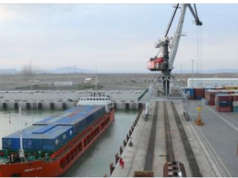International Maritime Organization (IMO) regulations to limit the sulphur content in fuel oil used on board ships will have the most significant effects on diesel wholesale margins, Trend reports referring to the EIA December Short-term Energy Outlook (STEO).
Beginning on January 1, 2020, the International Maritime Organization (IMO) enacted Annex VI of the International Convention for the Prevention of Pollution from Ships (MARPOL Convention), which lowers the maximum sulfur content of marine fuel oil used in ocean-going vessels from 3.5 percent of weight to 0.5 percent.
EIA forecasts that US refinery runs will rise by 3 percent from 2019 to a record level of 17.5 million b/d in 2020, resulting in refinery utilization rates that average 93 percent in 2020.
EIA expects one of the most significant effects of the regulation to be on diesel wholesale margins, which rise from an average of 45 cents per gallon (gal) in 2019 to a forecasted peak of 61 cents/gal in the first quarter of 2020 and an average of 57 cents/gal in 2020.
IMO regulations to reduce sulphur oxides (SOx) emissions from ships first came into force in 2005, under Annex VI of the International Convention for the Prevention of Pollution from Ships (known as the MARPOL Convention). Since then, the limits on sulphur oxides have been progressively tightened.
From 1 January 2020, the limit for sulphur in fuel oil used on board ships operating outside designated emission control areas was reduced to 0.50 percent m/m (mass by mass). This will significantly reduce the amount of sulphur oxides emanating from ships and should have major health and environmental benefits for the world, particularly for populations living close to ports and coasts.
The main type of “bunker” oil for ships is heavy fuel oil, derived as a residue from crude oil distillation. Crude oil contains sulphur which, following combustion in the engine, ends up in ship emissions. Sulphur oxides (SOx) are known to be harmful to human health, causing respiratory symptoms and lung disease. In the atmosphere, SOx can lead to acid rain, which can harm crops, forests and aquatic species, and contributes to the acidification of the oceans.
Limiting SOx emissions from ships will improve air quality and protects the environment.







